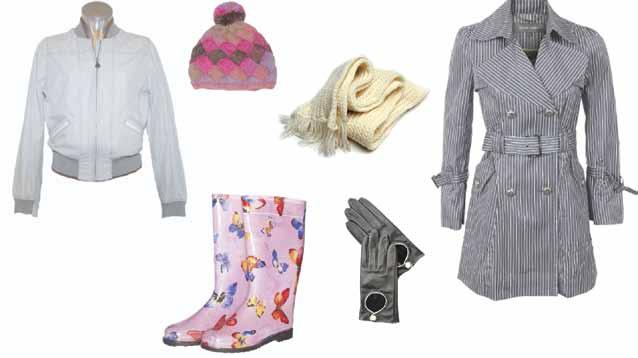
18 minute read
Unit 7 Seasons Dancing
Unit 7 Seasons Dancing lessons 93–95
Learn to talk about autumn clothes
Word Box
weather forecast to change raincoat wellington boots to grow taller/bigger/ smaller ... in warm / cold weather you look great in ... . Now that you mention it,
I ... . True, true. Oops!
Communication Box
1. Look and say in what season(s) you usually wear these clothes.
a woollen hat
a jacket a scarf
wellington boots
a pair of gloves a raincoat
Example: I usually wear a jacket in autumn.
2. Listen and repeat.
aUTUMN rHyMES September mild, October gold are followed by November cold. rain before seven, Fine before eleven.
/e/ – September, November, seven, eleven /əU/ – October, November, gold, cold
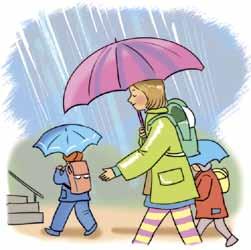
3. Look, match and say what you can do with these things in autumn.
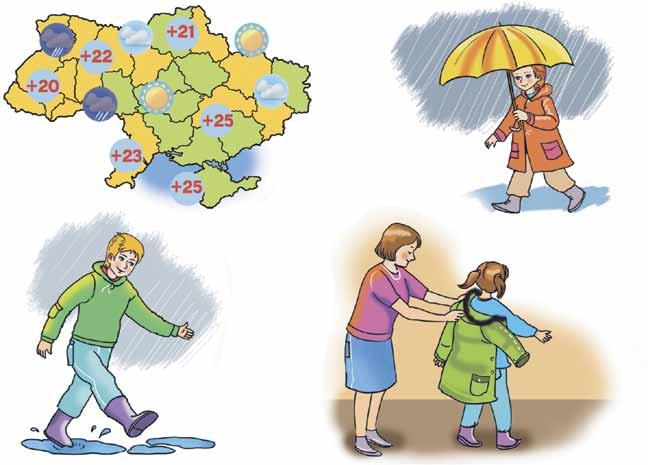
weather forecast a raincoat wellington boots a coat
Example: I can wear a raincoat on a rainy day.
4. Listen and reproduce.
aUTUMN ClOTHES Talk
Paul: Hey, Helen, you look great in your red jacket! Is it new? Helen: Thank you, Paul. I wore this jacket on cold days back in autumn. Paul: Now that you mention it, I remember! But it looked more like a coat then. Helen: True, true. and the sleeves were longer. Ha-ha! Paul: Why? What happened to your jacket? Did it grow smaller? Helen: Of course not! Nothing at all happened to my jacket. But something happened to me and you! Paul: But what? Helen: We have grown taller and bigger since autumn. look at your jeans! They are getting shorter and shorter. Paul: Oops!
Remember!
– We have grown taller and bigger since autumn. – They are getting shorter and shorter.
5. Talk with a friend about your autumn clothes.
Hey, _____, you look _______ in your ____. ____ new?
Thank you. I wore ____________.
Now that you mention it, I remember! But it looked more like ____.
True, true. And _______ were longer. Ha-ha!
Why? What happened to _________? Did ____ grow smaller?
Of course not! Nothing at all happened to _____. But something happened to _____.
But what?
We have grown ______ and _______. Look at your ______. ____getting ________.
Oops!
On your own: Draw your autumn clothes and say which of them have “grown smaller”.
Example: This is a picture of my raincoat. I wore it on rainy days back in autumn. It has “grown smaller” since then. The sleeves are too short. It means I have grown bigger.
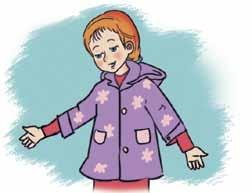
6. Look and guess what the weather is like in England in autumn (p.p. 131–132).
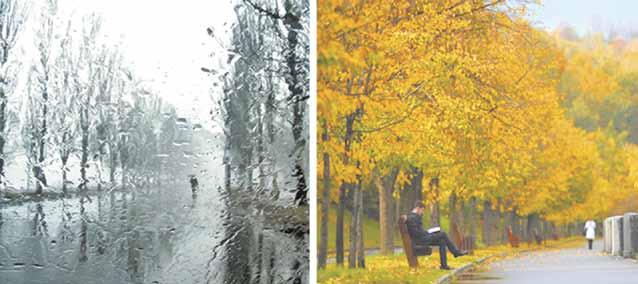
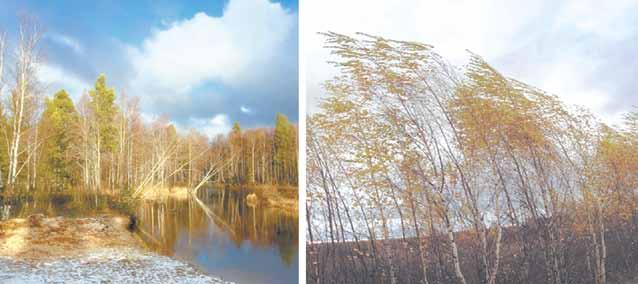
Example: I think the weather is ... in England in autumn.
7. Read and say if Helen dresses well in autumn.
THINGS TO WEar IN aUTUMN
I am an English girl. My name is Helen. I am eight. I live in a small but friendly family. I have got my mum, dad, and a little brother. My brother and I spend a lot of time outdoors. We always listen with interest to the weather forecast for the next day. Then my parents tell us how to dress well in warm or cold weather.
It is especially important to know what the day will be like in autumn. The weather changes very often in this season. They say September is mild, October is gold, but November is cold. So my brother and I need a lot of different clothes: a jacket for a chilly1
1 chilly – прохолодний
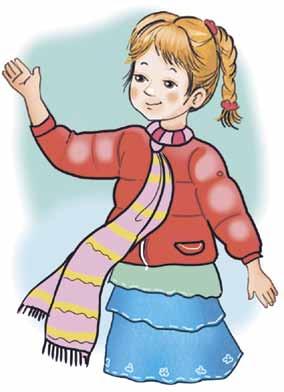
day, a raincoat and a pair of wellington boots to wear if it rains, a coat, a woollen hat and a scarf for colder weather.
My favourite autumn clothes are my red jacket and a long scarf. I want to wear them in spring, too. I have just tried them on. Oh my! The sleeves1 are too short! I have grown taller and bigger, haven’t I? That means that my brother is going to wear my jacket soon.
8. True or False?
1. Helen has got a little sister. 2. It is a tradition with Helen’s family to listen to the weather forecast. 3. Helen has different clothes for different types of weather. 4. The girl likes to wear a blue jacket in autumn. 5. Her jacket is not big enough for her now.
9. Talk with friends about your autumn clothes. Use:
I spend ... in autumn. My ... always listens to ... . Then she/he tells me how ... . The weather changes ... . So I need ... . My favourite autumn clothes are ... . I want to wear ... .
10. Write the weather forecast for an October day.
It is going to be a ... day. It will ... in the morning. The afternoon will be ... . Maybe, the weather will ... in the evening.
Do it yourself! Draw the clothes to wear on an October day.
1 sleeves – рукава
lessons 96–98
Learn to talk about winter weather
Word Box
sleet snowfall thunder sunshine frost It can’t be. ... , if you know what I mean. Sounds like fun. What a good idea! It’s all right with me. you won’t regret it.
Communication Box
1. Look and say what the weather forecast is for these winter days.
snowstorm
rain / wind
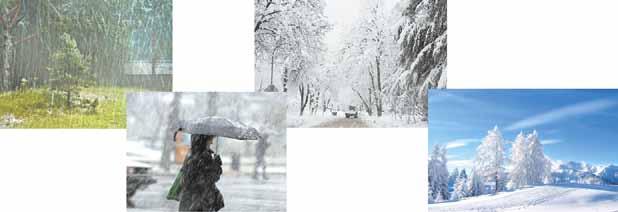
sleet sunshine
Example: It will rain, with a strong wind.
2. Listen and repeat.
WINTEr rHyMES
Winter’s thunder
Is the world’s wonder.
Snow is so snowy,
When it’s snowing. /w/ – winter, world, wonder /əU/ – snow, snowy, snowing
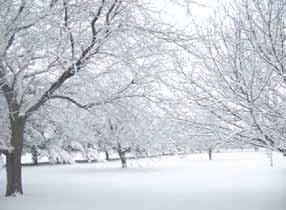
3. Look, match and say what winter weather these children like.
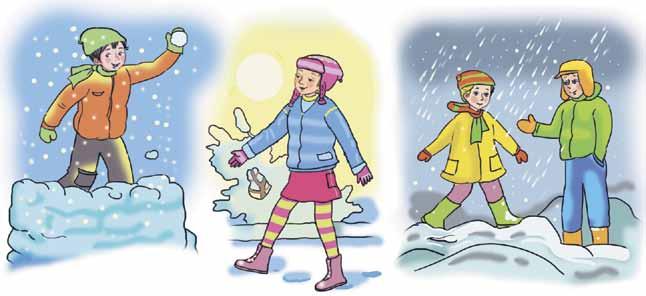
snowstorm, sleet, sunshine, frost
Example: The boy likes a snowstorm.
4. Listen and role-play.
WINTEr WEaTHEr Talk Oksana: I say, Paul, do you like the weather today? Paul: Sure. It’s snowing. What a lot of snow! let’s play with snow! Oksana: Oh no! The snow is so ... snowy, if you know what I mean. Paul: We can make the snow speak under our feet –“Crickle, crackle, crickle, crrreeet, crrreeet, crrreeet!” Oksana: Sounds like fun. Oh, have you heard? Paul: Heard what? Oksana: Thunder, I think. Paul: It can’t be. Winter’s thunder is the world’s wonder, you know. But we have already had a snowstorm, sleet and rain this winter. It was all right with me. I just put on my winter coat and warm boots. Oksana: Me, too. But how do birds feel in winter weather?
Paul: They find very little to eat. I feel so sorry for them. Oksana: let’s come out and feed them with bread crumbs. Paul: What a good idea!
Remember!
– Have you heard? – We have already had a snowstorm, sleet and rain this winter.
5. Talk with a friend about winter weather.
I say, ____, do you like __________ today?
Sure. It’s ________. What a lot of _____! Let’s _____. __.
Oh no! _________, if you know what I mean.
We can ______.
Sounds like fun.
We have already had ____ this winter. It was ___ with me I just _____.
Me, too. But how do _______ feel in ______?
They have very little ____. I feel sorry _____.
Let’s _______ and ______.
What a ______ idea!
On your own: Draw a picture of your favourite type of winter weather and write 3–5 sentences about it.
Example: Winter is all right with me. I like cold sunny days, with thick snow on the ground. I just put on my winter coat and warm boots. It’s a lot of fun to play snowballs in such fine weather.
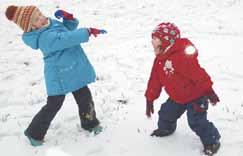
6. Look and guess what kinds of winter Wendy has in India1 .
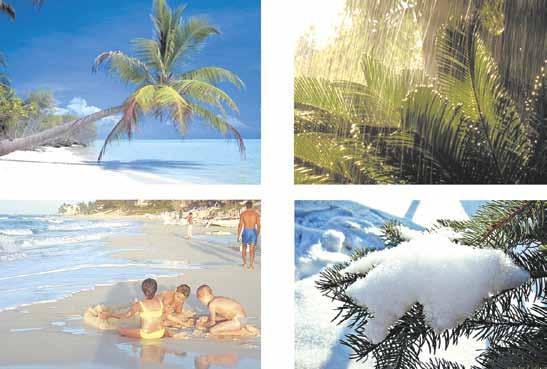
Example: I think Wendy has ... in India.
7. Read and say what is winter.
WHaT IS WINTEr?
Hi, Wendy,
I am writing to answer your question, “What is winter?” you ask me about it because it is never cold in India, where you live.
1 India – Індія, країна Південно-Східної Азії
So i am going to tell you about my favourite season. It is winter when everything is white with snow: the trees, the houses, the fields and the gardens. I’m a winter person, as my mum says. I like frost and snow, a lot of snow, when the snow is so snowy, if you know what I mean. It is just the day for playing snowballs. On a day like that, we can make the snow speak under our feet – “Crickle, crackle, crickle, crrreeet, crrreeet, crrreeet!” It sounds like fun, doesn’t it?
regards, Paul
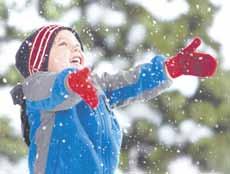
Hi, it’s me again
We have already had a snowstorm, sleet and rain this winter. It was all right with me. I just put on my winter coat and warm boots. But today my friend Oksana has heard thunder! at first I didn’t believe her as winter’s thunder is the world’s wonder, you know. Then I listened to the weather report and they said it was true. I couldn’t believe my ears!
Please, come to visit me in the wintertime. you won’t regret it!
yours, Paul
8. Read, choose and complete.
1. Paul is writing about ... . a. summer; b. autumn; c. winter.
2. Paul likes to play ... in this season. a. hockey; b. snowballs; c. football.
3. Paul hasn’t had ... this winter.
a. a rainbow; b. a thunderstorm; c. rain. 4. ... says he is a winter person. a. Paul’s mum; b. Paul’s dad; c. Paul’s teacher.
5. Paul usually puts on ... on a cold winter day. a. a jacket; b. a raincoat; c. a coat.
9. Talk with friends about winter. Use:
Winter is ... . Everything is ... . ... a winter person. I like ... . ... it you know what I mean. It is just the day for ... . On a day like that, ... . ... sounds like fun. We have already had ... . I just ... .
10. Write about typical winter weather at your place. Use:
Snow Thunder Sleet Snowstorm Frost
Do it yourself! Draw a picture of winter for Wendy, an Indian girl.
lessons 99–101
Learn to talk about nature in spring
Word Box
shower to stay indoors to melt to appear to keep warm to change quickly It looks / feels / smells like
... . I know what you mean. Never mind. Off we go!
Communication Box
1. Look and say what nature is like in spring.
strong winds
icicles
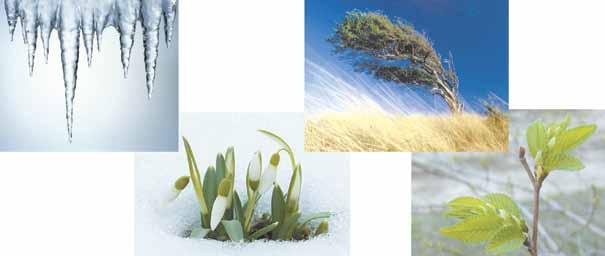
snowdrops green leaves
Example: We can see icicles in spring.
2. Listen and repeat.
SPrING TIME March winds and april showers Bring forth May flowers.
/aU/ – showers, flowers /I/ – winds, april, bring
3. Look, match and say what is happening on these spring days.
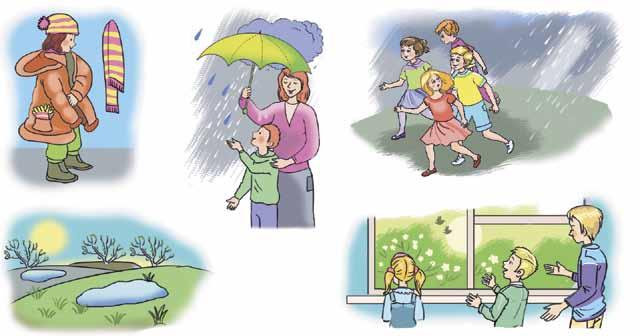
a shower, to stay indoors, to keep warm, to change quickly, to melt Example: The weather is changing quickly on this spring day.
4. Listen and role-play.
SPrING Talk Ann: look out of the window, John. Spring has come at last! John: yes, it looks like spring, and it feels like spring! I don’t like to stay indoors. Ann: Nobody does! let’s go to the park. The snow has melted almost everywhere, and we can smell spring there much better! John: Oh, you mean that first snowdrops have already appeared? Ann: They sure have. But there is a cold wind today. let’s walk faster to keep warm. John: Oh, it looks like rain! The weather changes so quickly in spring!
Ann: True, true. They say we can have four seasons a day in spring. John: I know what you mean. It is windy and chilly in the morning, then it rains or even snows, and after that it is warm and sunny. Ann: Never mind. March winds and april showers bring forth May flowers. John: Off we go!
Remember!
You can count: a snowdrop – snowdrops a wind – many winds a season – four seasons a day – two days They say we can have four seasons a day in spring.
You can’t count: spring, rain, snow, weather. It looks like spring!
5. Talk with a friend about spring. Use:
Look out of the window ______! Spring _________ at last!
Yes, it looks like _____. It feels like ____. I don’t want ______.
Nobody does. Let’s _______. The snow _____ and we can ____ much better!
Oh, you mean ________?
_____ sure _____. But there is _______. Let’s ____.
Oh, it looks like ______. The weather ______.
True, true. They say ______.
I know what you mean. ____ in the morning, then _______, and after that _____.
Never mind. Off we go!
On your own: Draw a picture of nature in spring and write 3–5 sentences about it. 6. Look and guess how the weather changed one day in April.
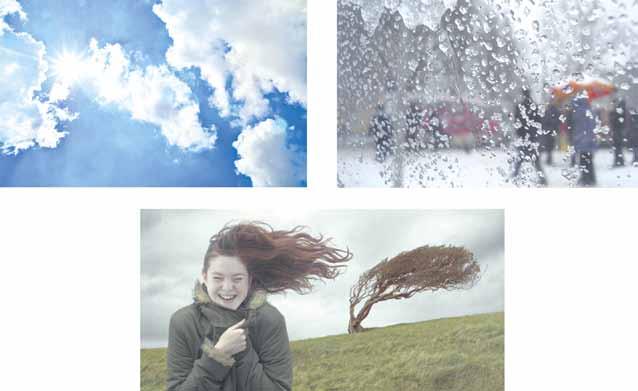
Example: I think ... is good for picnicking.
7. Read and say what seasons the children had on a spring walk.
ON a SPrING Walk
Spring has come at last! It looks like spring. It feels like spring. Nobody likes to stay indoors. But the weather in spring can change very quickly, you know.
One day in april my friend John and I went to the park. It was our first spring walk. The snow melted almost
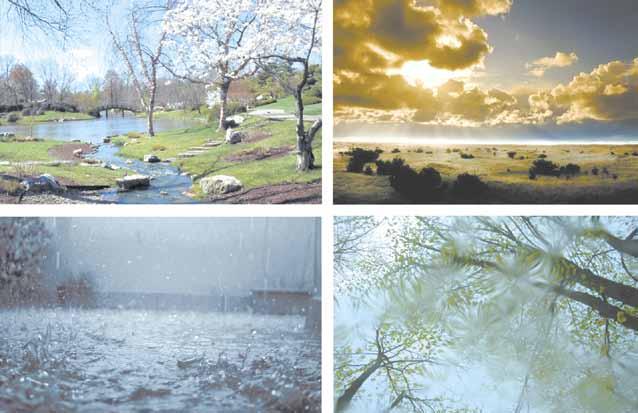
everywhere, first snowdrops appeared, and we could smell spring there much better.
When we started, the weather was beautiful. The sun was shining, the sky was blue, and there were no clouds at all. Then came a strong wind and black clouds. We walked faster to keep warm. John said, “look at the sky, ann! It looks like rain.” Unfortunately, I didn’t have an umbrella with me. So when the april shower began, we got very wet and very cold, too. While we were running to the bus stop, we even felt some snowflakes on our noses. But when we got on the bus, it stopped raining. It was sunny again.
No wonder they say we can have four seasons a day in spring.
8. Answer the questions.
1. Why does nobody like to stay in the room in spring? 2. What does ann tell us about the weather in spring? 3. The children had an umbrella with them, didn’t they? 4. Did they get wet or cold? 5. How many seasons did they have on that day?
9. Talk with friends about nature in spring. Use:
Spring ... at last! The snow ... . Fist snowdrops ... . It looks ... . It feels ... . It even smells ... . But the weather can ... . It can be ... in the morning. Then ... , and after that ... . No wonder they say ... .
10. Write about nature in spring for your class weather report.
Use:
What does it look like? What does it feel like? What does it smell like?
Do it yourself! Trace and colour a memo for a spring day:
• how to keep warm; • how not to get wet.
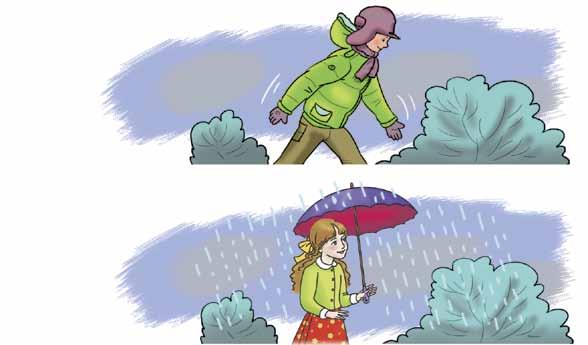
lessons 102–104
Learn to talk about summer time
Word Box Communication Box
to spend time outdoors to go out of town to be tired after sth flower garden kitchen garden to get off the bus to wait for sb I can’t wait to see ... . I don’t want to. What’s the matter with you? What?! aren’t you ...?
1. Look and say what children can do in summer.
a flower garden, to spend time outdoors to go out of town, can’t wait to see sb
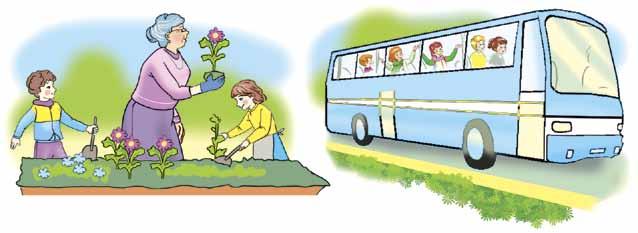
Example: Children can spend a lot of time outdoors.
2. Listen and repeat.
SUMMEr rHyMES 1. June too soon, July, stand by; august, it must, September, remember, October, all over.
2. Mary, Mary, quite contrary, How does your garden grow?
With silver bells and cockle shells, and pretty maids all in a row.
/ü/ – June, too, soon /³/ – June, July /əU/ – grow, row, October, over
3. Look, match and say what these children are doing on a summer day.
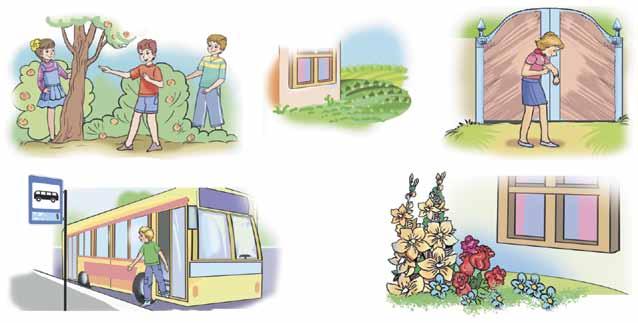
flower garden, a kitchen garden, to spend time outdoors, to get off the bus, to wait for sb
Example: The children are spending time outdoors on this summer day.
4. Listen and reproduce.
SUMMEr TIME Talk Andrew: look here, Mary, our summer holidays are coming. Mary: So what? Andrew: It means that it is time to play. We can spend a lot of time outdoors, play all kinds of games,
and go to the river or out of town. I can’t wait to start! Mary: I don’t want to. Andrew: What?! aren’t you tired after your school year?! Mary: I am, but I don’t want to play. Andrew: and don’t you want to have summer fun? Don’t you want to have ice cream? Mary: No, I don’t. Andrew: What’s the matter with you? are you Mary, Mary, Quite Contrary today? Mary: No, no! I was just kidding. Of course, I do want to play and I do want to have summer fun! Andrew: let’s have some ice cream then! Mary: Ok! all kinds of ice cream!
Remember!
– Do you want to play? – I don’t want to play. – Don’t you want to play? – I do want to play.
5. Talk with a friend about summer time. Use:
Look here, ___. Our summer holidays __________.
So what?
It means that it is time to _____. We can ____. I can’t wait to _____.
I don’t want to.
What?! Aren’t you tired after ________?
Agreed. I like this holiday tradition.
And what are you going _______. There is _____ in the centre of the town.
And there is ________too. We can ________.
On your own: Take your summer photo and write 3–5 sentences about summer fun.
Example: This is my summer photo. I am having a lot of fun. I am at the river with my family. We are having ice cream and playing around.
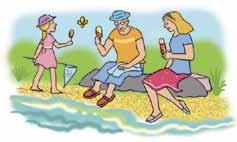
6. Look and guess what fun Andrew is going to have in summer.
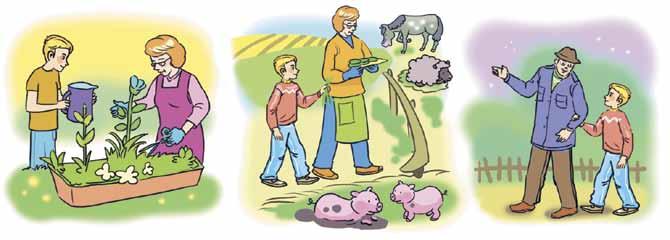
Example: I think Andrew is going to ... . It will be a lot of fun.
7. Read and say why Andrew wanted to go to the village.
aNDrEW’S SUMMEr HOlIDayS
Part One
One day in June andrew’s father came home from his office and said, “andrew, I have a letter here from your aunt Maria. She asks me to send you to her for a week or two.”
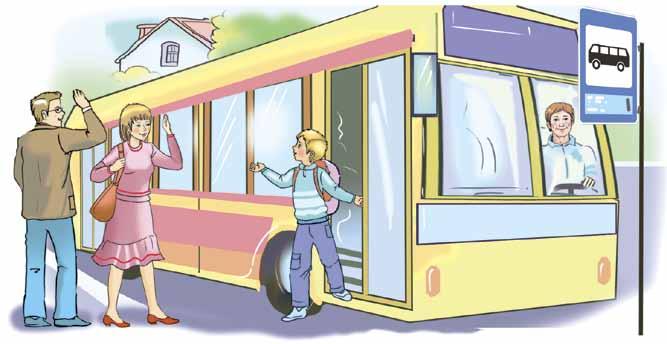
aunt Maria was the sister of andrew’s father and she lived in a small village, in a very nice house with a beautiful flower garden in front of it and a large kitchen garden1 at the back. There was so much fun to have there in summer time!
Part Two
“Oh, Dad! I can’ wait to see her very much! Please, send me to her. I want to see Grandfather, too.” The father looked at andrew and said, “all right, andrew, I will, you must help them in the garden and you must be very polite when you are there.”
“Of course, I will help aunt Maria in her flower garden and I will go for a walk with Grandfather in the evening, and I will say “Thank you” and “Please” many times a day!”
The next day andrew went by bus to see his aunt and grandfather. When the bus stopped in the small village where his aunt lived, andrew got off the bus and crossed the village street. and there was Grandfather was waiting for him. andrew’s summer holidays began!
1 a kitchen garden – город
8. True or False?
1. andrew lived in a small village. 2. His mother told him some news. 3. andrew wanted to visit his relatives. 4. He promised to be a good boy. 5. His father took him to the village by car.
9. Talk with friends about your summer holidays.
Summer is time to ... . We can ... . I can’t wait to ... . There is so much fun to ... . I will ... and I will ... . One day in June, ... . My summer holidays ... .
10. Write about your summer fun in the calendar. Use:
June July august
Do it yourself! Make a summer diary for your friend.
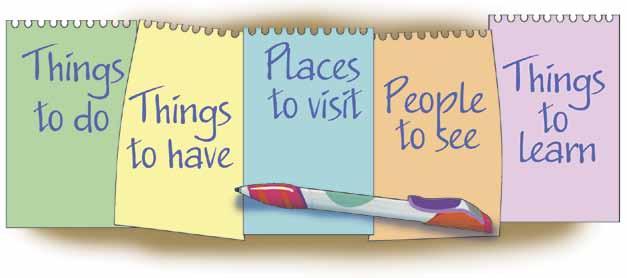
lesson 105 an Extra lesson Резервний урок

